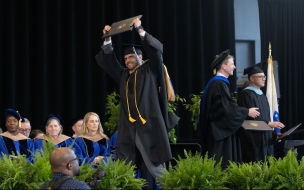Following an undergraduate law degree, she worked as an advocate and solicitor for two years before shifting gears and going into management consulting, and subsequently pursuing an MBA.
A winning recipient of one of Henley's scholarships, Baini spoke to BusinessBecause about how the MBA added to her skill-set, her aspirations for the future, and the advice she would give to young lawyers who are planning to pursue an MBA.
Your background is in law. Why did you decide to pursue a business management degree?
While studying law, my involvement in the student’s organization known as Enactus stimulated my intellectual appetite for the business world.
Through Enactus, I conducted various business-community programs from Malaysia to Mexico, competing internationally against university students, and was eventually selected for the opportunity of a lifetime – a business internship initiative program in the United States. I got hands-on experience helping NGOs and micro-entrepreneurs, as well as [the opportunity to] meet and learn business skills from key international business leaders.
My growing entrepreneurial spirit, coupled with corporate law, naturally aroused my interest in the complimentary relationship between law and business.
How was your transition from working as an advocate and solicitor to working as a management consultant at KPMG?
It was a totally different experience. I had to grasp many technical skills and change my way of thinking, to be more innovative. As an advocate and solicitor, I had to be thorough in reviewing agreements. But as a management consultant, I had to add value by thinking more analytically and creatively, and by doing more research under time constraints.
But I had more time to travel and meet new people [as a consultant], which is a good platform for networking, and I was also given the freedom to think on my own two feet.
Do you feel that the MBA has added value to your knowledge?
Definitely. [The] MBA exposed me to an international environment – [I had] team members from different countries, different work cultures and personalities. When you join the MBA with an open mind to learn and accept criticism or constructive feedback, and accept people and cultural differences and lay down your evidence when defending your argument, you will learn the most.
What made you pick Henley Business School?
It is the most reputed and established European business school. Besides reputation, Henley approached potential students with a one-to-one individual approach, which is original.
It also distinguishes itself with different types of programs by looking ahead at future business trends. Its location in two campuses is the best place for executives to relax and study.
Its alumni network is also huge, with significant business leaders, especially in the Europe.
What are your career plans?
One thing which I am still pursuing is the opportunity to work in the aviation industry. My dissertation is based on the competitive dynamics of the airline industries in Asia and Europe. I like the challenge of an international corporation overlooking a volatile industry environment, yet it’s exciting to explore.
But even so, I am not limiting myself – [I may] even go back to management consulting. Business strategy always excites me, and now I have more confidence talking about case studies and theories.
What advice would you give to law graduates who are considering an MBA?
There must be a balanced equilibrium of preparation for the business world – courage, a willingness to learn, being critical and constructive. I value the skills and knowledge that I gained both as an advocate and management consultant.
Managerial experience is also key, similar to [the] passion in accounting and finance [that is required] if you come from legal background. The world is limitless, and passion determines focus.
RECAPTHA :
84
3a
8f
9d







